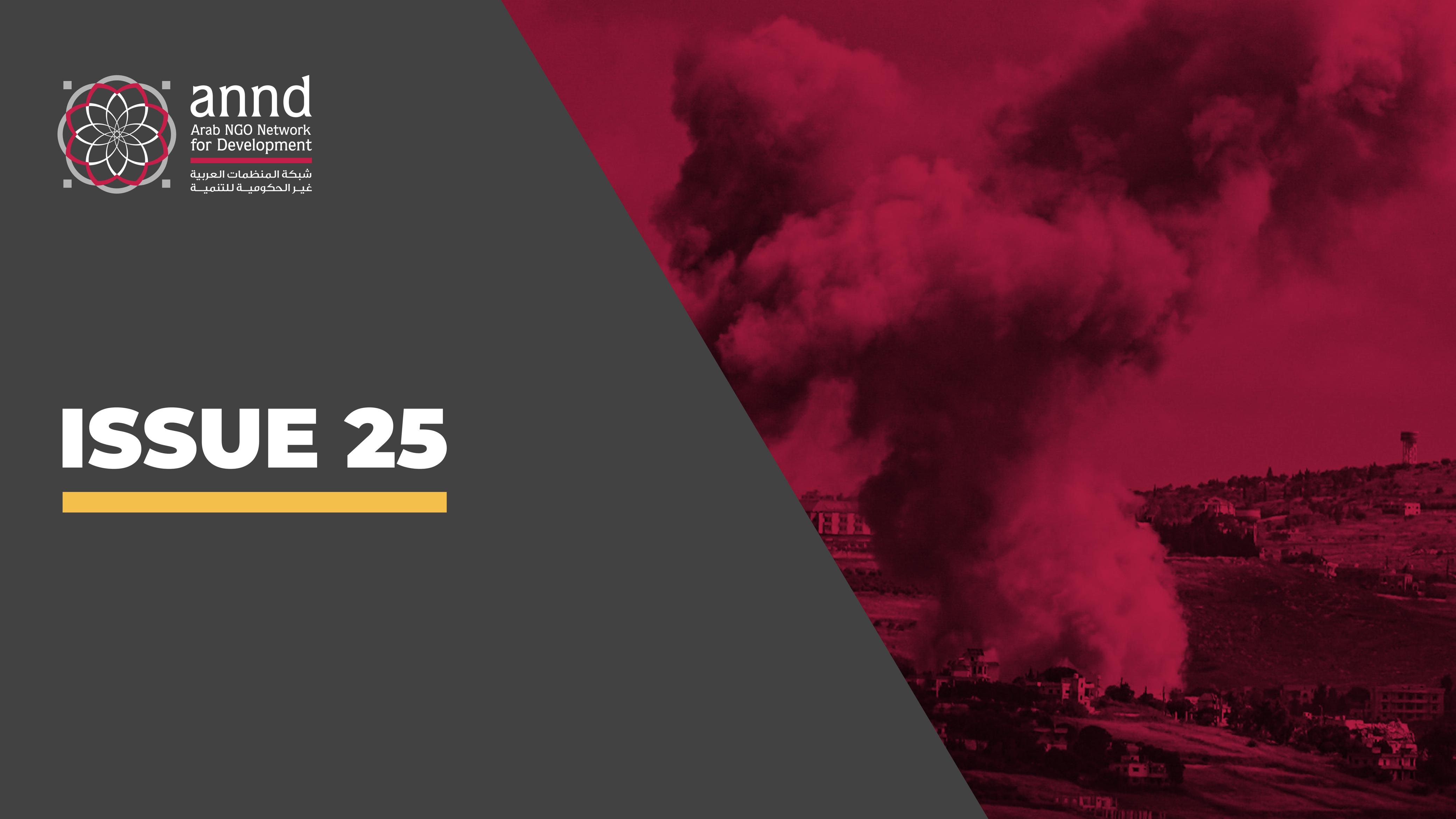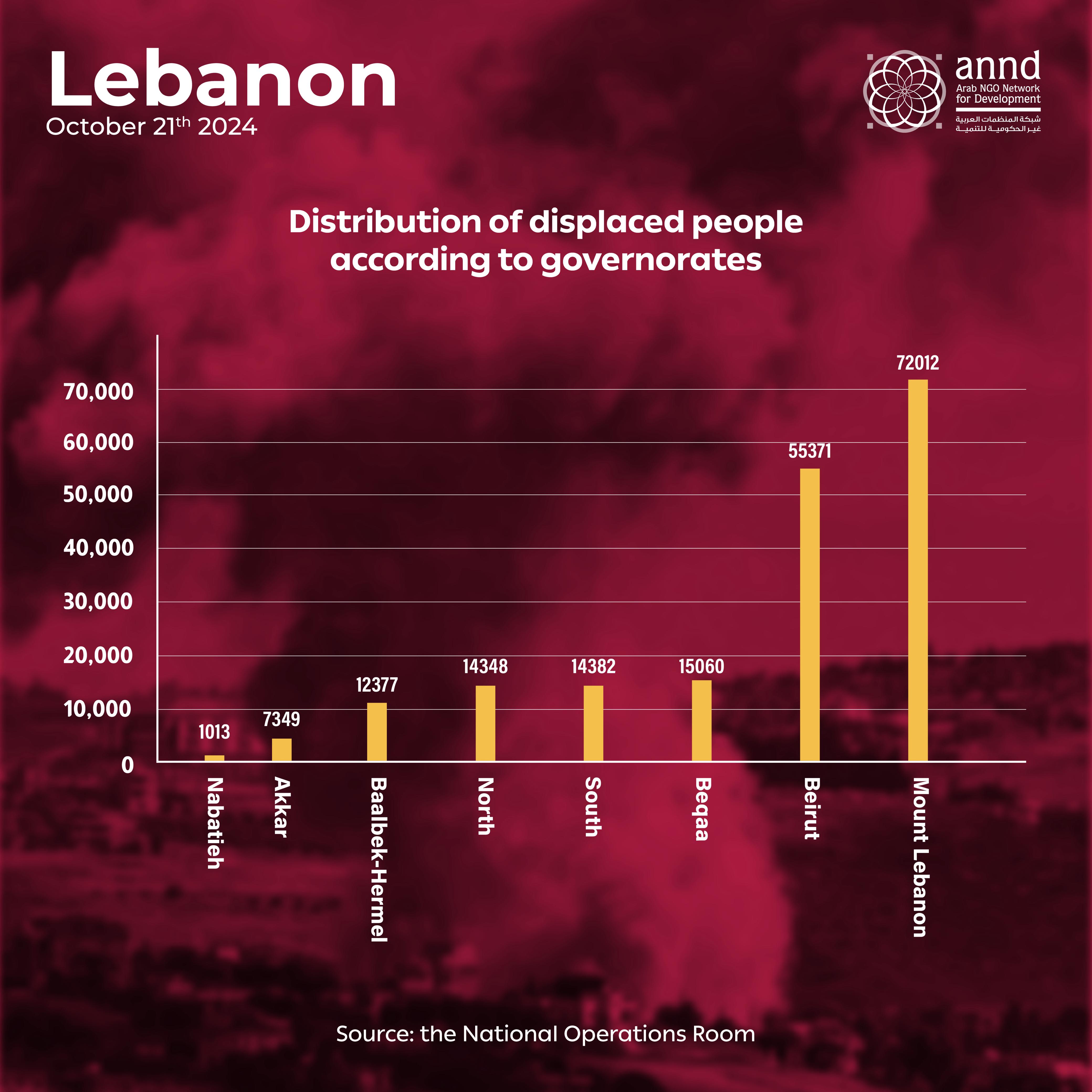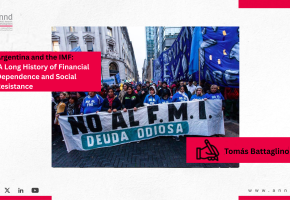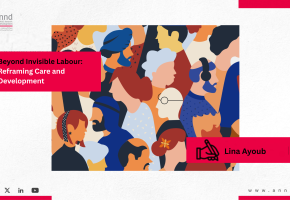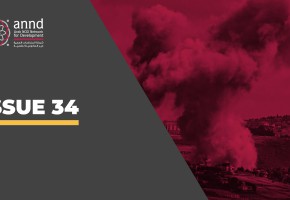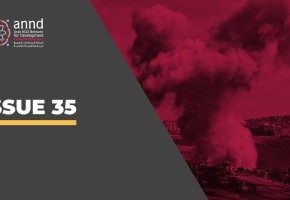A Region on Fire
Issue 25 - October 21, 2024
Lebanon and Gaza's political processes remain stalled, the threat of bombing Iran is escalating: the region is on Fire
Gaza: The genocide in Jabalia continues, with no international or regional response to distress calls or efforts to halt the unprecedented massacre.
Lebanon: Diplomatic activity has intensified with the arrival of U.S. envoy Hochstein, yet no immediate steps appear likely to lead to a solution. The struggle over implementing international resolutions persists, particularly regarding the enforcement of Resolution 1701 with new strict mechanisms and the rejection of Israel's demands for military operations by its air, naval, and ground forces in Lebanon post-agreement. Internally, political disputes continue over whether to prioritize a ceasefire or the election of a new president and restructuring of state institutions. There is also disagreement on whether to accept both Resolutions 1701 and 1559 or to accept the former while rejecting the latter completely.
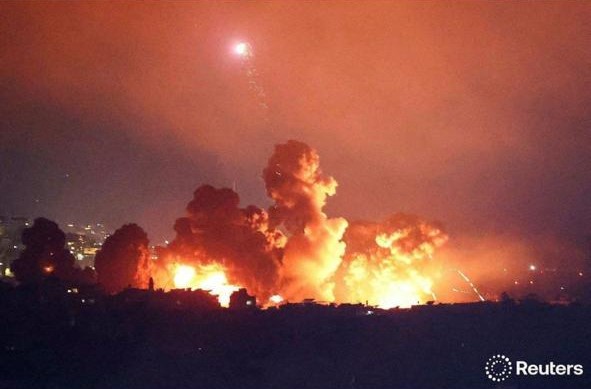
Gaza: UNRWA Commissioner-General: Israel is denying humanitarian aid from reaching northern Gaza.
Philippe Lazzarini, Commissioner-General of the United Nations Relief and Works Agency for Palestine Refugees (UNRWA), stated that Israel is denying humanitarian aid from reaching northern Gaza. In a post on X, he noted that Palestinians in northern Gaza are under siege, with Israeli attacks targeting hospitals, leaving them without electricity and denying medical services to the wounded. He also highlighted the overcrowding in UNRWA shelters due to intensified Israeli attacks. Lazzarini warned that withholding humanitarian aid or using it as a weapon reflects a severe moral decline.
UNRWA warned of catastrophic conditions in the Jabalia camp, which has been under siege for over two weeks. The agency reported families trapped in their homes, with dwindling supplies of water and food. Images from the camp show residents running for their lives with no safe place to seek refuge. The agency also revealed that Israel rejected an urgent request to evacuate those trapped under the rubble due to its attacks in northern Gaza.
The UN stressed that recent attacks on hospitals in northern Gaza are worsening the humanitarian crisis and endangering thousands of lives. Medical supplies and care must be prioritized to prevent further loss of life.
The Palestinian Ministry of Health condemned the direct targeting of the Indonesian hospital in northern Gaza, which was set ablaze, and confirmed that the occupation is besieging hospitals. The ministry highlighted the catastrophic situation, with bodies of martyrs and the wounded lying in the streets as ambulances are unable to reach them. The ministry also coordinated to bring fuel and food to hospitals, but Israeli forces have blocked access. Since the beginning of the assault on northern Gaza, 600 martyrs have been reported. The Israeli army is also working to displace Palestinians from northern Gaza.
A Gaza field hospital director told Al Jazeera that the Israeli army is preventing the transfer of patients from northern hospitals.
Eyewitnesses reported that Israeli forces besieging Jabalia camp forced displaced people sheltering at UNRWA's "Karizm" school to gather and evacuate. Israeli artillery then fired a shell at them, killing at least seven and wounding dozens. Six civilians, including children, were killed and others wounded in an airstrike as they tried to collect drinking water in Jabalia. In another Israeli drone strike near Al-Yemen Al-Saeed hospital in Jabalia camp, four civilians were killed. Nine more were killed, and dozens injured in Gaza City, while three more died in an attack on a school sheltering displaced people in Beit Hanoun. A total of 41 civilians were reported killed in airstrikes across Gaza since Monday morning.
Abu Ubaida, the spokesperson for the Izz al-Din al-Qassam Brigades, announced the death of an Israeli female prisoner in northern Gaza under mysterious circumstances. He stated that an investigation is ongoing, and her name would not be revealed for security reasons.
Reports also surfaced of the killing of secretary-general of Palestinian Islamic Jihad (PIJ), in an Israeli airstrike in Damascus.
Germany's foreign ministry spokesperson emphasized that Gaza residents must be allowed access to water, food, and medicine.
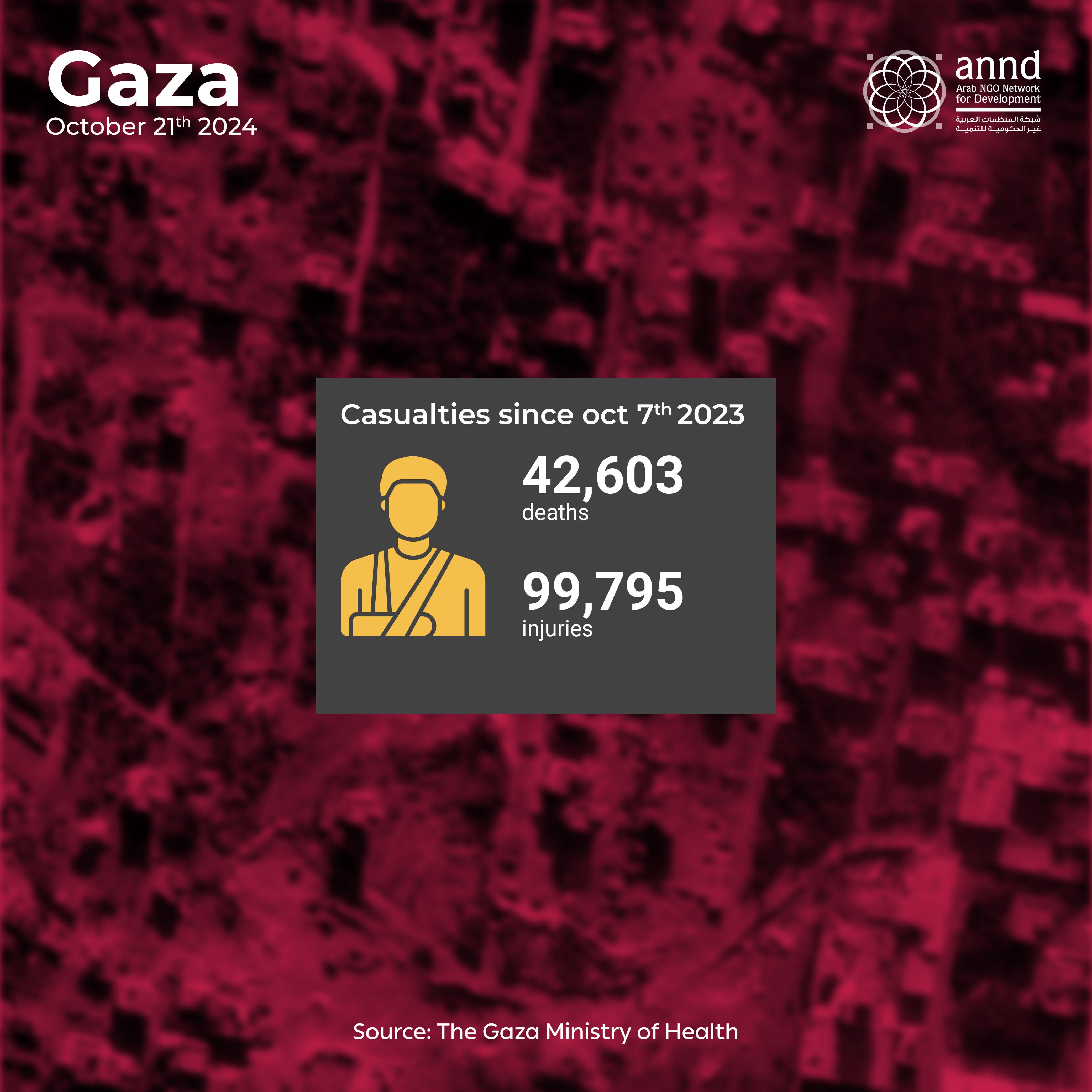
Battlefield Developments in Lebanon
The Israeli army has carried out demolitions in the town of Aita al-Shaab, accompanied by airstrikes and artillery bombardment targeting the south and Bekaa regions. Israeli army spokesperson Avichay Adraee announced that special units are using new combat tactics and precision munitions in their fight against Hezbollah in southern Lebanon.
Israel continues targeting civilians, adding to its record of massacres, including a recent attack on Nabi An'am neighborhood in Baalbek, where a drone targeted an inhabited house, killing six children and women from the Othman family and injuring eight others.
Hezbollah continues to launch with missile strikes on northern Israel and resists Israeli ground incursions.
Domestically, a major clash erupted between displaced people and security forces attempting to evacuate a building in Beirut’s Hamra Street. Protesters blocked the road with burning tires in anger over the eviction.
Interior Minister Bassam Mawlawi announced quick measures to ensure security, especially near shelters, and stressed that no armed appearances or attacks on private or public property would be tolerated.
After Israeli airstrikes targeted Hezbollah-affiliated "Al-Qard al-Hassan" in Beirut and Hermel, Israel's Defense Minister Yoav Gallant added the association to the list of terrorist organizations.
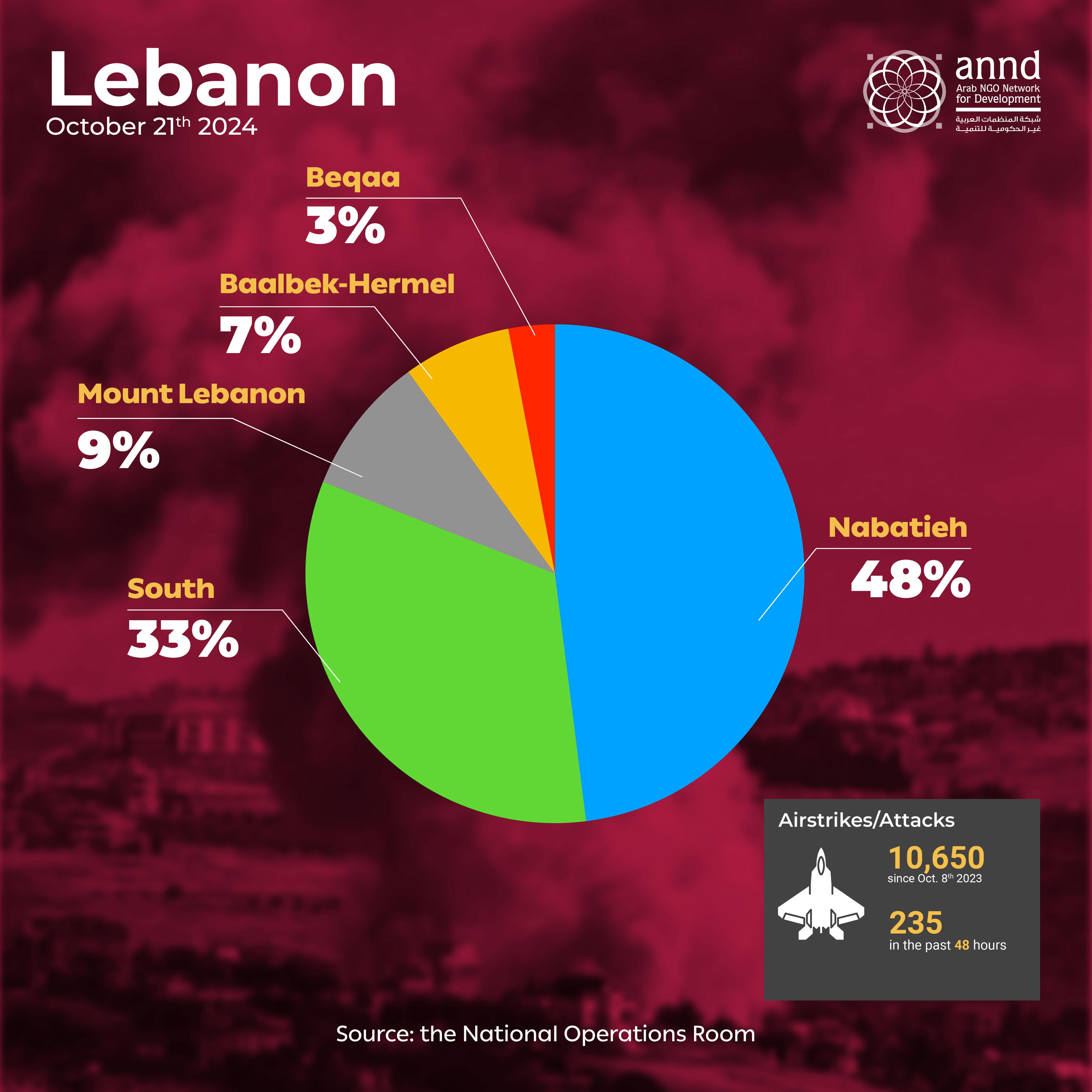
In the past 48 hours, Lebanon has experienced 235 airstrikes, mainly concentrated in the south and Nabatieh, bringing the total attacks to 10,650 since the conflict began.
The Lebanese Ministry of Health reported 19 martyrs and 98 wounded, raising the total death toll to 2,467 and 11,569 injured since the start of the aggression.
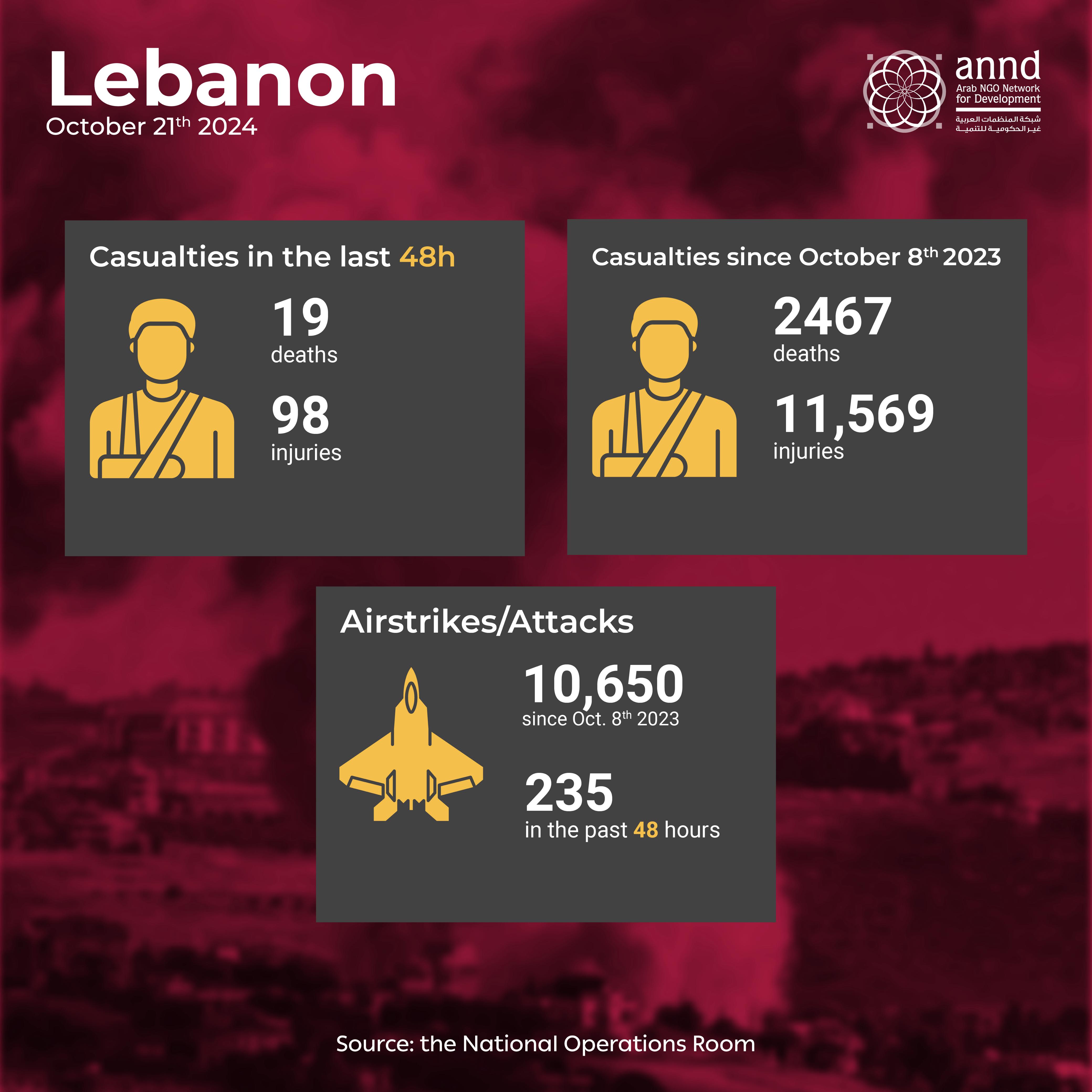
Political Positions in Lebanon
U.S. special envoy Amos Hochstein stated after his meeting with Speaker of the Parliament Nabih Berri that he feels saddened by Lebanon's suffering after months of unresolved conflict. He noted that the situation has spiraled out of control, and linking Lebanon's future to conflicts is not in the interest of the Lebanese, adding that the failure to implement Resolution 1701 is the reason for the escalation and continuation of this conflict. He reaffirmed the U.S. dedication to resolving the situation in Lebanon in accordance with Resolution 1701 but emphasized that the commitment from both sides alone is insufficient. The Lebanese government requires additional support, and Washington is ready to provide the necessary assistance. He pointed out that the international community is committed on reconstruction and supporting the Lebanese army, stating that there would be no discussions about amending Resolution 1701, but rather about exploring its implementation. He highlighted that the Biden administration aims to ensure this is the last conflict in Lebanon for generations to come.
For his part, Speaker Nabih Berri stated that the meeting was productive, emphasizing that the proof is in the results. According to media reports, Berri informed Hochstein that the elected president will oversee the implementation of Resolution 1701 and work towards achieving a permanent ceasefire, and that a three-week truce agreement could be reconsidered. He also indicated to Hochstein that Lebanon could elect a president in the first week of the truce.
Prime Minister Najib Mikati emphasized during his meeting with Hochstein that the priority is to achieve a ceasefire and the full implementation of Resolution 1701, as it is the cornerstone of stability in the region. Mikati noted that diplomatic efforts are active and aim to reach a near ceasefire.
Arab League Secretary-General Ahmed Aboul Gheit confirmed after meeting Speaker Nabih Berri that the Arab League stands by Lebanon in this ordeal, hoping for the required breakthrough to happen quickly as the situation is grave, and the violence and loss of life are distressing. He expressed regret over the observed neglect from a force that has often spoken about principles worldwide. He stated that Resolution 1701 is pivotal and should be implemented literally and as quickly as possible, with no tolerance for the harsh treatment faced by UNIFIL in southern Lebanon. He emphasized that the priorities are an immediate ceasefire and the election of a president.
Regarding Iranian interventions in Lebanese affairs, Prime Minister Najib Mikati stated that he conveyed to the Iranian leadership to tone down their sentiments towards Lebanon. He personally reviewed the dialogue with Qalibaf and communicated his objections, and the message has reached the Iranians. He added that he understands that Iran supports negotiations, but no one speaks on behalf of the Lebanese state.
The Iranian Foreign Ministry rejected the accusations made by Mikati regarding interference in Lebanese affairs, affirming that choosing a president for Lebanon is a matter for the Lebanese and active forces on the ground. They also announced that Iran would consult with any country proposing initiatives to stop Israeli aggressions against Lebanon.
Mikati reaffirmed Lebanon's commitment to Resolution 1701, stating that it provides stability, emphasizing that the diplomatic solution to the situation in Lebanon is still on the table.
The Lebanese Ministry of Foreign Affairs and Emigrants expressed its sincere gratitude to the United Nations Interim Force in Lebanon (UNIFIL) for its role in maintaining peace and security in southern Lebanon since its establishment in 1978. The Ministry acknowledged UNIFIL's contributions to the development of local communities, building stability in the region, and ensuring citizens' steadfastness in their land.
The Ministry strongly condemned the repeated Israeli assaults on UNIFIL centers and personnel, including Israel's demand to evacuate its positions. These actions constitute a blatant violation of international law and humanitarian law and could amount to a war crime. They also reflect Israel's refusal to implement UN General Assembly and Security Council resolutions, particularly Resolution 1701.
The Ministry urged the international community to take a firm stance in support of UNIFIL, ensuring its continued operations and protecting it from any aggression or threats to its security. Furthermore, it called for the condemnation of Israel's actions, compelling it to immediately cease its hostile practices against UNIFIL in adherence to the principles upon which the United Nations was founded, which member states must uphold and reinforce through all available means.
Lebanese Foreign Minister Abdullah Bou Habib, after meeting with Vatican Foreign Minister Cardinal Richard Paul Gallagher in Rome, stated that the Vatican is concerned about the deteriorating conditions in Lebanon, particularly the fate of 16 Christian villages in southern Lebanon, in addition to the political stagnation and the lack of an elected president for the republic.
Former Lebanese President Michel Sleiman stated that if there is any intention to amend Resolution 1701, it should explicitly name the Islamic Republic, after Iran officially took over Hezbollah and appointed an Iranian supervisor over it.
Lebanese Forces Party leader Samir Geagea noted that the historical relationship between Lebanon and Iran was excellent until the transition to the Islamic Republic, but what Iranian Parliament Speaker Qalibaf stated is incorrect, as Iran has been a pillar for a specific group of Lebanese, namely Hezbollah, which led to the emergence of a statelet at the expense of the state.
Humanitarian Response in Lebanon
As of this date, 1,094 centers have been opened to receive and shelter displaced persons. Of these centers, 901 have reached their maximum capacity.
The movement of displacement continues from areas that are experiencing daily attacks to safer regions. The total number of registered displaced persons has reached 191,912 individuals in accredited shelters, including 44,806 families. Mount Lebanon and Beirut have recorded the highest percentages of displaced persons, but estimates suggest that the actual number may be much higher.
From September 23 to October 21, 2024, the General Security recorded the crossing of 341,849 Syrian citizens and 144,830 Lebanese citizens into Syrian territory.
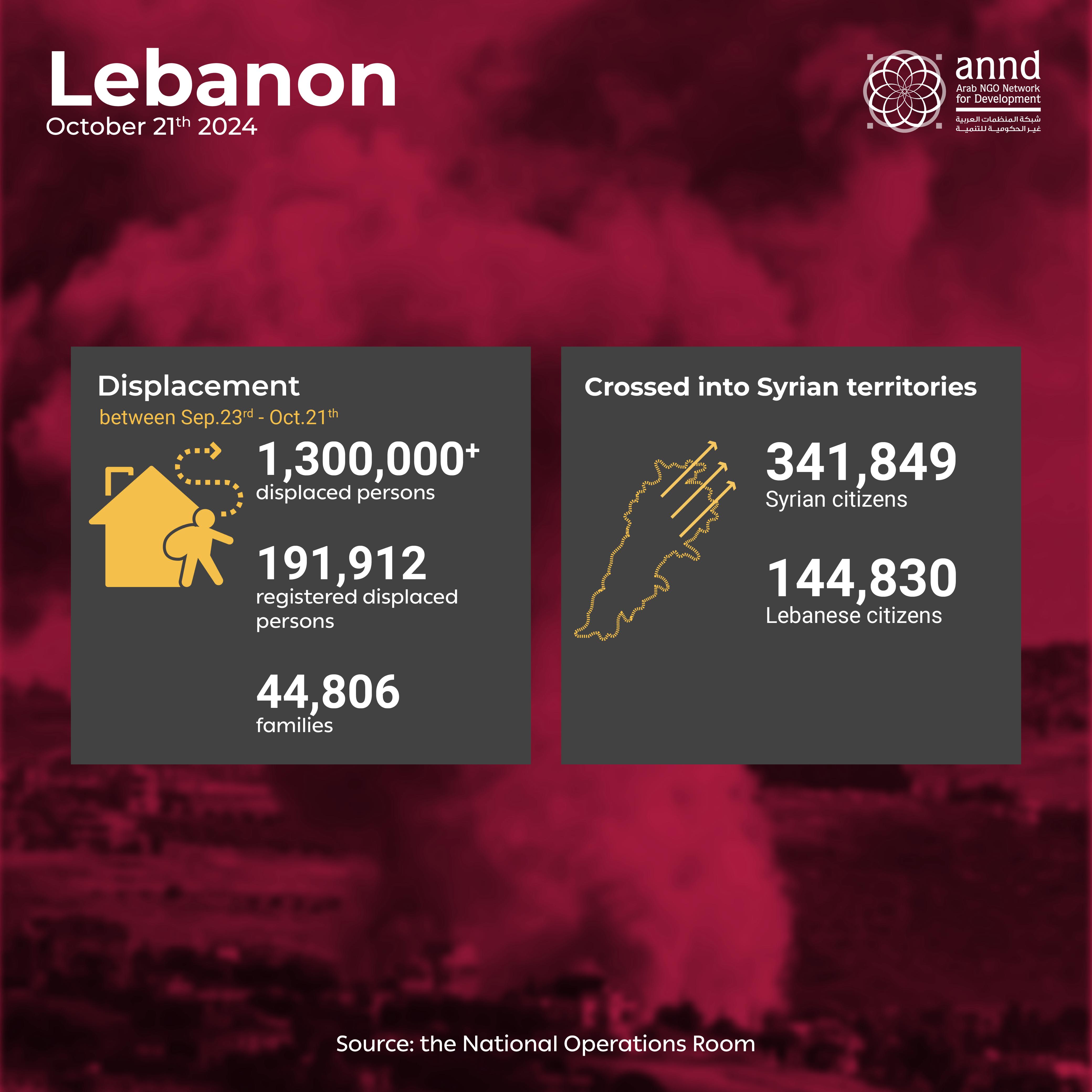
According to information released by UNRWA, it is estimated that around 421,000 people have been displaced from Lebanon to Syria. As of October 20, 635 families of Palestinian refugees—approximately 3,000 individuals based on average household sizes—who were displaced from Lebanon have contacted UNRWA in Syria. However, the actual number of Palestinian refugee families that crossed the border is believed to be much higher, particularly in northern and eastern rural Damascus.
The United Nations High Commissioner for Refugees reported that Syrian immigration authorities continue to accept displaced persons with flexibility, and the Syrian government has extended a waiver until early November 2024 for returning Syrians, including Palestinian refugees from Syria, requiring them to exchange 100 USD at the border before entry. However, Lebanese immigration has resumed the exit stamp protocol, which may slow the processing of displaced persons at the border or discourage the use of official border crossings.
According to the International Organization for Migration, in support of the emergency response led by the government, the humanitarian community has launched an urgent inter-agency appeal for 426 million USD to assist one million people over the next three months. The organization needs 32.46 million USD for urgent life-saving assistance in areas such as shelter, basic needs, health, protection, site management, and coordination.
At Rafic Hariri International Airport in Beirut, the Minister of Public Health received a shipment of urgent medical aid weighing 55.7 tons of medical supplies, provided by the Government of the People's Republic of China. The aid was officially received in the ambassadors' lounge.
A Saudi plane, the ninth in the Saudi-Lebanese airlift, arrived at Beirut Airport, carrying food and relief materials.
International Positions
White House National Security Communications Adviser John Kirby stated that Secretary of State Antony Blinken is working on options for the day after Gaza, and no final decision has been reached regarding the forces that will manage security there.
The Élysée Palace reported that French President Emmanuel Macron urged Israeli Prime Minister Benjamin Netanyahu to work on protecting civilians in Lebanon.
The Emir of Qatar discussed developments in the region, particularly in Gaza and Lebanon, with the Italian President and Prime Minister, focusing on efforts to de-escalate and achieve a ceasefire.
Germany announced that it expects the Israeli government to "clarify every incident" involving the United Nations Interim Force in Lebanon (UNIFIL) and urged it to explain the circumstances surrounding the destruction of a watchtower and fence in the south. Germany also expressed concern about the extensive blockade on northern Gaza.
Pope Francis, after meeting with Patriarch Bechara al-Rahi, expressed his "constant closeness to the Lebanese people" and his commitment to preserving Lebanon's character of diversity, dialogue, and coexistence, as well as the role, mission, and presence of Christians in the country.
The Wall Street Journal quoted an Israeli official stating that Israel will target Hezbollah's financial resources to prevent its reconstruction and rearmament.
The Israeli Ministry of Defense stated that the scope of American aid is estimated at 8.7 billion dollars, with 3.5 billion dollars allocated for essential military purchases for the Israeli army.
The Israeli Defense Minister declared that they are engaged in a challenging war, which he described as the most just in their history, and that the Israeli army is continuing its operations.
Haaretz reported that Western diplomats indicated Israel has not done enough to address their concerns, and they are struggling to gather information about the situation in Gaza, with no one able to explain what is happening there, which fuels speculation about Israel's objectives in the operation.
Axios noted that Israel presented the United States last week with a document outlining its principles for reaching a diplomatic solution to end the war in Lebanon. The report added that Amos Hochstein, the U.S. special envoy, who is visiting Beirut today, will discuss with Lebanese officials potential diplomatic avenues to resolve the conflict.
Walla reported, citing American and Israeli officials, that the principles document allows displaced persons on both sides of the border to return to their homes.
According to the site, the document also permits the Israeli army to ensure that Hezbollah does not rearm and grants the Israeli Air Force freedom to operate in Lebanese airspace.
